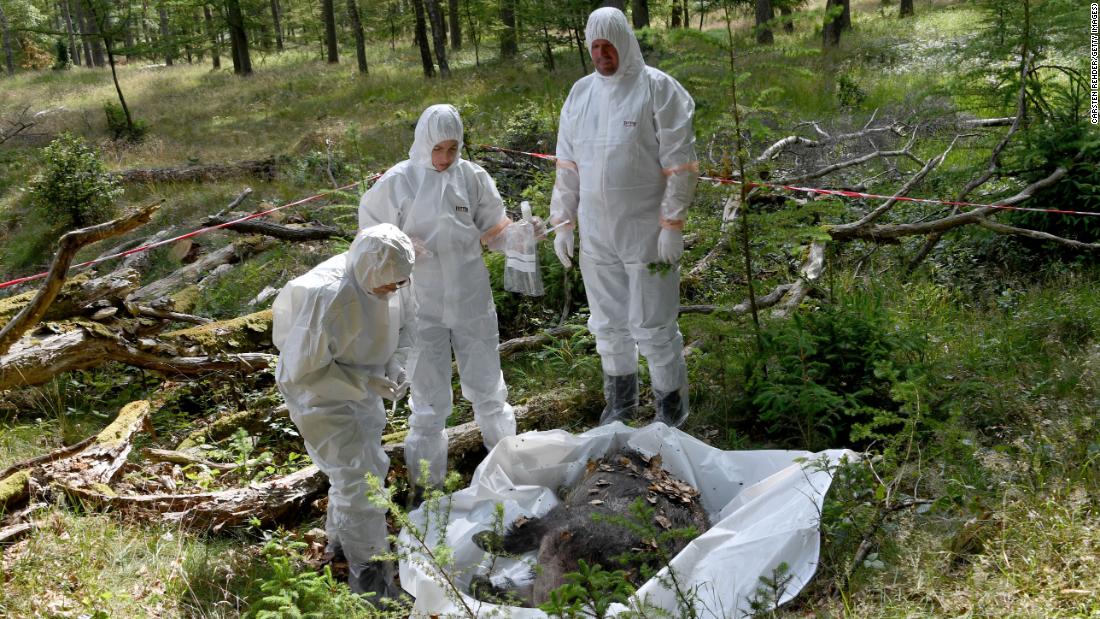Good Fences Equal Exclusions of Choice
"Long-distance spread of A.S.F. [African swine fever] can happen anytime, all over Europe."
"Fences cannot prevent such events."
Dr. Klaus Depner, Federal Research Institute for Animal Health, Germany
"It's not a border fence. I don't want to hear any of that."
"It's a veterinary fence made to protect our animals."
Refslund Hansen, farmer, Denmark
"It's very un-European to build fences and boundaries between countries."
"I fight for free movement in every other context. When it's right in this context it's because such a large part of exports is at risk."
Minister of Environment and Food, Jakob Ellemann-Jenson, Denmark
 |
African swine fever virus represents a threat to the production of pork which happens to be a major export for Denmark. The virus is readily spread, highly resilient and capable of surviving in pork products and feces for months, leading to easy transition. No vaccine is available nor any type of treatment against it. Outbreaks can only be contained by culling swine populations. Romania did just that, slaughtering 230,000 pigs in the process.
Some Danes are responding to a government initiative to build a fence along its border with Germany in hopes of isolating wild pigs on the other side of the border, with the suspicion that its true purpose is to keep refugees that have inundated Germany from using the European Union's 'invisible borders and free movement' to their advantage to exit Germany and enter Denmark.
Authorities in Denmark have reached the conclusion that the country has absorbed more than enough such migrants, with the concern that they are failing to adequately integrate.
 |
What the government poses as a deterrent to wildlife, those willing to absorb greater numbers of haven seekers identify as an opaque plan to deter refugees from entry to the country.
The virus in question is considered harmless to African animals such as warthogs and bush pigs as well as to people. Wild boars and domestic pigs are another story altogether; in them it causes a hemorrhagic fever that often becomes lethal. It has become widespread in Russia in recent years, and outbreaks have been reported in Romania, Belgium, Bulgaria and parts of China.
Denmark's government has conceived of a $20-million public awareness campaign, permission to hunt wild boars, and a fence some 1.5 meters in height along the 70-kilometer land border across the neck of the Jutland peninsula, from the Baltic to the North Sea. Environmentalists have appealed to the EU to stop the building of the fence, though work is set to begin early next year. There are planned openings for 14 border crossings, five waterways and local farmer passages allowing the movement of people and goods.
Boars are to be the target of the deterrent fence, although deer and otters will still be 'permitted' to cross. Perhaps signage will do the trick. Critics of the fence point out that wild pigs are intelligent and curious, foraging over great distances. The European Food Safety Authority concluded "there is no evidence that large fences have been effective for the containment of wild suids" (pig animal family). "It's like creating your retirement fund by buying a lottery ticket", jeered Hans Kristensen, a hunter opposed to the fence.
Cameras are to be placed where roads cut through the fence, ostensibly to record how frequently boars manage to circumvent the fence. A request has been received by the minister of justice from the Danish People's Party that the cameras be used as well to identify people attempting the illegal crossing of the border.
In reality, all Denmark has to do is to reasonably declare that they have absorbed more than enough Muslim migrants and have no intention whatever of taking in any more, just as Poland and Hungary have, and be done with it. No subterfuge is needed with a legitimate decision that enough is enough....
 |
| Veterinarians inspect a dead boar during an African swine fever outbreak exercise in Germany in June. |

<< Home